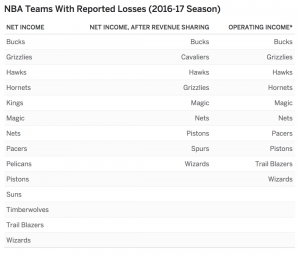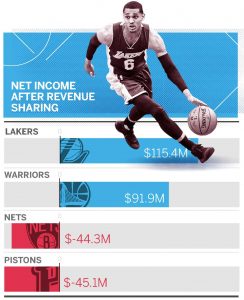
The simple objective for professional sports teams is to win a championship, unless it isn’t. Professional sports is about making money and that is no different in the National Basketball Association (NBA). One of the major questions faced by the Association is how much revenue should be shared between teams (Windhorst, 2017).

(NBA Teams with Reported Losses)
One concern brought up by highly profitable teams is that it’s unfair to penalize an organization with a good location and strong management. If someone buys a prime plot of real estate that generates a high rate of return then it’s subject to a tax that increases based on tax brackets; however, we don’t assess an additional tax if the property outperforms those around it. NBA owners who buy franchises with small markets and limited revenue streams know from the outset how difficult it will be to turn a profit, but willingly purchase the team anyways. It’s not the fault of the profitable teams that a bad business decision was made (Windhorst, 2017). The counter to that argument is that it would be difficult for the NBA to function as a 16 team league (Windhorst, 2017). It would mean a shorter schedule equating to less television revenue and a decrease in the fan base from markets that no longer have a team. Even if the number of teams were to be cut down the competition inequality, that currently hurts teams who can’t afford to pay high player salaries, would still exists with the wealthy teams being able to pay salary cap penalties to bring in the big names (Windhorst, 2017). Without some form of revenue sharing, getting close to equality – both on and off the court – is nearly impossible.

(Net Income After Revenue Sharing)
The issue of revenue sharing also brings strategy into question: short term revenue or long term sustainability. NBA owners have a limited timespan to make money off of their team meaning that it is in their interest to raise the current market value. It makes no sense to make an investment that will improve the equality in the NBA down the road when the current ownership will see little of the benefit. Even if current owners were to reap in some of the benefits, the net future value of that money would be less than the current value of the money spent, assuming proper investment. In the long term, increasing the revenue sharing pool would allow more teams to spend money on player salaries in order to be competitive; attracting more interest and larger fan bases to purchase their products (Windhorst, 2017).
In a league where money equals success, is it fair to allow small market teams to perpetually lose money or should more be done to ensure everyone has an equal chance of success?
(446 words)
Sources
Windhorst, B. (2017, September 19). A confidential report shows nearly half the NBA lost money last season. Now what? Retrieved September 25, 2017, from http://www.espn.com/nba/story/_/id/20747413/a-confidential-report-shows-nearly-half-nba-lost-money-last-season-now-what
Images:
NBA Teams with Reported Losses [Digital image]. (2017, September 19). Retrieved September 25, 2017, from http://www.espn.com/nba/story/_/id/20747413/a-confidential-report-shows-nearly-half-nba-lost-money-last-season-now-what
Net Income After Revenue Sharing [Digital image]. (2017, September 19). Retrieved September 25, 2017, from NBA Teams with Reported Losses [Digital image]. (2017, September 19). Retrieved September 25, 2017, from http://www.espn.com/nba/story/_/id/20747413/a-confidential-report-shows-nearly-half-nba-lost-money-last-season-now-what
What’s Wrong With the Golden State Warriors? [Golden State Warriors Team]. (2017, January 24). Retrieved September 25, 2017, from https://static01.nyt.com/images/2017/01/25/sports/25warriors-web/25warriors-web-facebookJumbo.jpg
*Note from the author: much of this blog has be written from my past knowledge of the NBA, professional sports, and revenue sharing across different leagues.